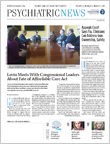As political and legal conflicts in the United States flare over immigrants and refugees, a serious look at the complex psychological aspects of migration seemed in order for a group of psychiatrists preparing a special session for APA’s Annual Meeting in San Diego.
They will highlight the ethical dilemmas and the social responsibilities that psychiatrists face when treating newcomers, as well as the appropriate psychiatric interventions to help them.
Too often, refugees and immigrants are marginalized in the United States because of their poverty, minority status, or legal standing, said organizer Eugenio Rothe, M.D., a professor of psychiatry and public health at Florida International University in Coral Gables.
“At the APA meeting, we want to raise the issue of unwanted immigrants, people seen as a threat to American society allegedly due to their inability to assimilate, their displacement of American workers, their abuse of social services, or their supposed increased criminality,” said Rothe, who is also vice president of the American Association of Social Psychiatry.
The demonization of newcomers contrasts with the notion that the United States as a “nation of immigrants.” It also conflicts with a longstanding tradition of providing a haven for refugees fleeing war or political persecution, according to Rothe.
Other speakers will include Aida Mihajlovic, M.D., Jacob Sperber, M.D., Andres Pumariega, M.D., and Pedro Ruiz, M.D. The symposium is intended to “dispel myths and clarify the statistics” surrounding immigration, said Rothe.
Mental illness and health are tied closely to migration status. The basic tenet of American refugee policy is that asylum is granted to refugees based on a “credible fear” of harm back in their home countries. The experience or threat of torture, imprisonment, or death for religious, ethnic, or political status not only violates an individual’s human rights but can have detrimental psychiatric effects, he noted.
“Those effects can be delayed by months, years, or decades when people are prohibited from mourning their personal or material losses,” said Rothe.
Popular belief to the contrary, immigrants are less likely to commit crimes after their arrival in the United States, said Rothe.
“Yet immigrants may arrive in the United States with preexisting posttraumatic stress disorder, and other traumas related to violence, oppression, wars, and civil unrest in their countries of origin may account for more adverse mental health outcomes,” he said. “Poverty and marginalization in the receiving country further increase these odds.” ■
“The Unwanted Immigrant: Mental Health and Social Responsibility” will be held Tuesday, May 23, from 2 p.m. to 5 p.m. in the San Diego Convention Center.

